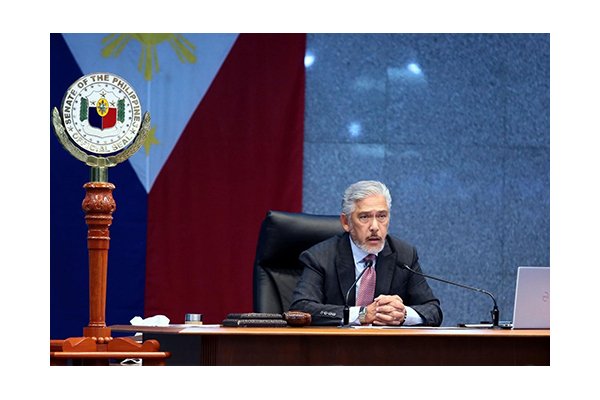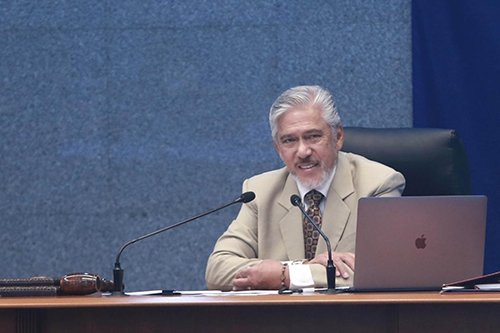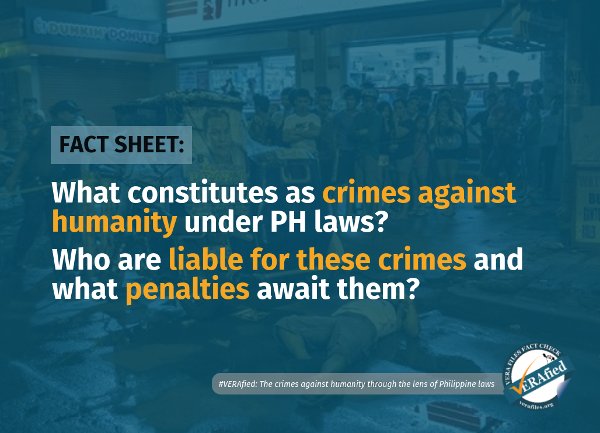Senate President Vicente “Tito” Sotto III implicitly claimed that unvaccinated persons against the coronavirus disease 2019 (COVID-19) have nothing to fear if they are surrounded by fully vaccinated individuals. This needs context.
STATEMENT
In a radio interview on June 12, Sotto floated the possibility of senators returning physically to the Senate halls when the third regular session of the 18th Congress convenes in July, since, he said, most of the Senate employees have already been vaccinated.
He went on to say:
“It is a good sign that everything is becoming normal na, ‘di ba? Sapagkat — ang alam ko ngayon, mahigit 80% of the Senate employees, vaccinated na eh. By Saturday, mga 80% sa kanila vaccinated na. O eh siyempre, ito namang mga senador, marami naman sa kanila vaccinated na. Kung ikaw, hindi ka vaccinated, pero lahat ng nakapaligid sa iyo vaccinated, ano ang ikakatakot mo, hindi ba?”
(It is a good sign that everything is becoming normal already, right? Because — to my knowledge now, more than 80% of the Senate employees are already vaccinated. By Saturday, around 80% of them will have been vaccinated. And, of course, for the senators, many of them are already vaccinated. If you’re not vaccinated but everyone around you are, what do you have to fear, right?)
Source: RPN DXKS Surigao, USAPANG SENADO with CELY ORTEGA – BUENO @ RPN DXKS Surigao (Transcript), June 12, 2021, watch from 16:08 to 17:30
The lawmaker said going back to an in-person set-up in the Senate would send a “good signal” and provide a “good example” to the public.
FACT
That unvaccinated persons need not worry of getting infected with COVID-19 in the presence of fully vaccinated individuals needs context.
While a vaccine “promise[s] protection against the severe form [of the disease], hospitalization, and even death,” the Department of Health reiterated that it is “not a magic bullet.”
In a June 21 email to VERA Files Fact Check, the department’s communications management unit said “there is no sufficient evidence to date as to whether vaccinated individuals contract or transmit the virus to others anymore.”
Hence, its reminders to the public “remain the same” regardless of vaccination status: strictly adhere to the minimum public health standards and other safety protocols, including wearing face masks and shields, practicing physical distancing, and frequent handwashing.
The World Health Organization (WHO) has likewise advised vaccinated individuals to “keep taking precautions” since “we still don’t know the extent to which [a COVID-19 vaccine] keeps you from being infected and passing the virus on to others.”
“The more we allow the virus to spread, the more opportunity the virus has to change,” WHO said in an explainer on its website.
Health authorities in some countries, like the United States and in Europe, have recommended the loosening of restrictions for fully vaccinated individuals, noting based on “limited evidence” that their risk of transmitting SARS-CoV-2, the virus that causes COVID-19, to those unvaccinated is “reduced.”
While this may be the case, some public health and medical experts have said those fully protected must continue practicing caution.
Namandje Bumpus, director of the pharmacology and molecular sciences department at Johns Hopkins Medicine, said fully vaccinated people “need to stay diligent” in protecting those who have yet to receive their jabs by wearing masks and practicing physical distance in public places. This is because, while “new data” show the risk of passing on the virus is “low,” it is “not zero.”
A global team of public health experts convened by international nonprofit Meedan gave similar advice, saying, as the effects of vaccination on COVID-19 spread are being studied, fully protected people “should continue to wear masks in public, stay six feet apart[,] and avoid crowded and poorly ventilated spaces.”
Sources
RPN DXKS Surigao, USAPANG SENADO with CELY ORTEGA – BUENO @ RPN DXKS Surigao (Transcript), June 12, 2021
Department of Health, Protocols for Vaccinated Individuals, June 21, 2021
Department of Health, Administrative Order 2020-0015, April 27, 2020
Department of Health, BIDA Solusyon sa COVID-19, Accessed on June 22, 2021
World Health Organization, COVID-19 advice for the public: Getting vaccinated, Accessed on June 22, 2021
European Centre for Disease Prevention and Control, Interim guidance on the benefits of full vaccination against COVID-19 for transmission and implications for non-pharmaceutical interventions, April 21, 2021
U.S. CDC, Interim Public Health Recommendations for Fully Vaccinated People, Last updated on May 28, 2021
U.S. CDC, When You’ve Been Fully Vaccinated: How to Protect Yourself and Others, Last updated June 17, 2021
Johns Hopkins Bloomberg School of Public Health, What You Need to Know About the CDC’s COVID-19 Guidance for Fully Vaccinated Individuals, Last updated in June 2021
Johns Hopkins Medicine, What’s Safe After Your COVID-19 Vaccine?, Last updated on May 25, 2021
Meedan Health Desk, What can and can’t people do after being fully vaccinated?, Last updated on June 18, 2021
(Guided by the code of principles of the International Fact-Checking Network at Poynter, VERA Files tracks the false claims, flip-flops, misleading statements of public officials and figures, and debunks them with factual evidence. Find out more about this initiative and our methodology.)




